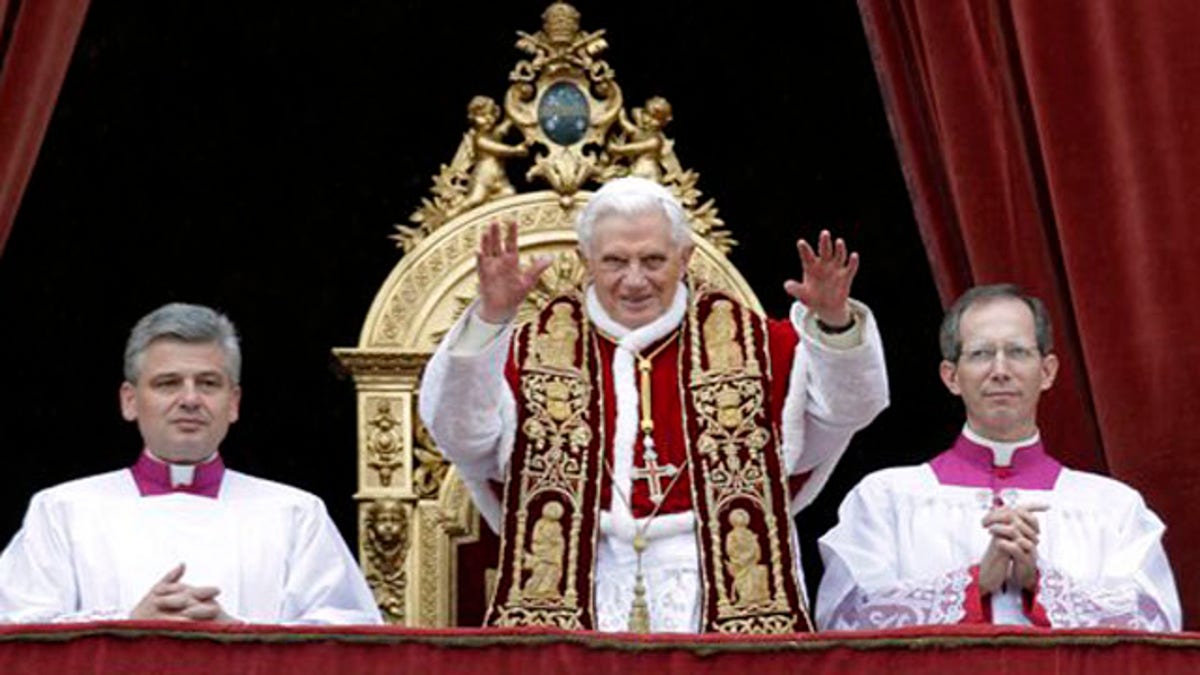
Dec 25: Pope Benedict XVI blesses the faithful during the Urbi et Orbi (to the City and to the World) message in St. Peter's square at the Vatican. (AP)
God or the Big Bang? Why not both? Things aren't all black and white in the Vatican, it seems.
Pope Benedict XVI made headlines last week during a sermon that made a case for the similarity of science and religion, two disciplines on quest for the truth. Christopher T. Baglow, director of the Pope Benedict XVI Institute for Faith, Ethics and Science explained the nuance the pope tried to convey.
"The Italian word in question is concorrenza, which means 'rivalry,' not 'concurrence,'" he told FoxNews.com. In other words, Pope Benedict pointed out that God and the Big Bang aren't at odds -- not that they don't square up.
Surprised? Don't be. The church has long argued for a reconciliation of science and faith. Reality is a far cry from the caricature often seen in pop culture, in movies like "The DaVinci Code" and "Angels and Demons" that portray the Catholic Church as butting heads with science.
That's good fiction, but it's just not true.
In fact, it was a Roman Catholic priest, Fr. Georges Lemaitre, who first proposed the Big Bang theory in 1927, on the basis of Albert Einstein’s theory of relativity, according to the American Natural History Museum in New York. The current Pope wrote about it in a 1995 book, and John Paul II called science a "highway to wonder" way back in 1979.
The Big Bang debate is just one example of the line Vatican scientists must walk. And there are many scientists indeed at the Pontifical Academy of Sciences in Rome, where Stephen Hawking and friends have discussed topics as diverse as biology, astronomy and chemistry.
Not all scientists believe there will ever be accord between science and religion, of course.
"Reconciling science with Christian religion is impossible," Zbigniew Jaworowski, a medical doctor, and a professor emeritus of natural sciences at the Central Laboratory for Radiological Protection, in Warsaw, Poland, told FoxNews.com. "Let the Pope stick with his sacred book, and let science follow its way."
The Academy will continue to try, however.
It recently appointed Werner Arber, a Nobel Prize-winning microbiologist, as president, and plans a working group this spring on the fate of mountain glaciers. Last fall the Pontifical Academy sponsored a lecture by Cardinal Giovanni Battista Re that sought to reconcile the relationship that science and faith have with water. Recent sessions have focused on "human neuroplasticity" and "the scientific legacy of the 20th century."
And the Catholic Church is not the only organization studying the nexus between science and religion these days. At Saint Olaf’s College in Northfield, MN, the topic is a regular subject of inquiry.
"We have a relatively new program called Science Conversation that in part regularly addresses the science vs. religion’ issue," spokesman David Gonnerman told FoxNews.com.
Binghamton University in NY offers a for-credit course of study called "Evolutionary Religious Studies" as well, which offers an introduction to the study of religion from an "evolutionary" perspective. Even the American Association for the Advancement of Science (AAAS) is getting involved. At the group’s 2011 meeting in Washington, D.C. next month, a scholar from Syracuse University will present a paper entitled, "Teaching and Learning about Biological Evolution in the Muslim World," as part of a panel discussion on evolution and religion.
For years, the Church has sought a reconciliation of science and faith. Back in 2005, French Cardinal Paul Poupard, in a news conference at the Vatican, said that the church wanted to help end the "mutual prejudice" between religion and science.
The project was apparently motivated by Pope John Paul II’s 1992 declaration that the church’s 17th-century excommunication of Galileo was a grievous error stemming from "tragic mutual incomprehension." Galileo was condemned for supporting Nicolaus Copernicus’ discovery that the Earth revolved around the sun; church teaching at the time placed the Earth at the center of the universe.
"The permanent lesson that the Galileo case represents pushes us to keep alive the dialogue between the various disciplines, and in particular between theology and the natural sciences, if we want to prevent similar episodes from repeating themselves in the future," Poupard said at that news conference.
There is hope for a reconciliation of science and religion among some scientific minds today. The work of this pope and his predecessor may be starting to yield results, said Jeffrey Schloss, chair of natural sciences and director of the Center for Faith, Philosophy and the Biosciences at Westmont College, in Santa Barbara, Calif.
"The [Pope’s] comments on the Big Bang fully accept the science of the evolving cosmos and don't claim any laws were miraculously broken," he told FoxNews.com.
"They only suggest that prior to any laws that were describable scientifically, there was a Being who devised them and brought them into existence -- through the Big Bang," he said.
